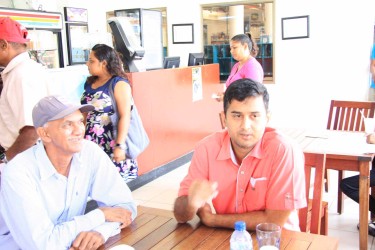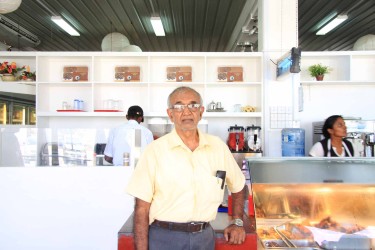Currently in its 65th year of operation, the highly diversified Affiance-based enterprise Imam Bacchus & Sons is one of the best-known businesses on the Essequibo Coast and when Stabroek Business visited the Cinderella County last week, we thought it would be useful to engage the proprietors in our quest to ‘test’ the temperature of the Essequibo economy.

The first generation owner, Imam Bacchus, bought a 100-acre rice cultivation and milling operation – from a British businessman named Mr Seymour – the latter comprising a one-stage rice mill the function of which was simply to separate the grains from the paddy and to produce an animal feed by-product. All that changed over the years.
In 1960, the company acquired a multi-stage rice mill which significantly improved the capital intensiveness of their operations.
These days, Imam Bacchus & Sons prides itself on milling, packaging and marketing their own rice. The firm’s increased milling capacity means that it purchases 50,000 bags of paddy per crop from other farmers Once the components – which have already been imported into Guyana – for a second silo have been assembled and the silo is operational by mid next year, Imam Bacchus & Sons will be doubling the volume of its paddy purchases.
Over time, the family gradually diversified their operations into an impressive range of businesses. The diversification began during the 1960s when, in the wake of the civil disturbances, the enterprise secured the permission of the District Commissioner to serve as the distributor of food and fuel along the Essequibo Coast. Once that arrangement ended, the elder Bacchus set up his own grocery store.
During the 1970s, the company commenced the production of chowmein having acquired a mill left behind by a Chinese national who had returned home after setting up a manufacturing operation here. Subsequently, the company added a poultry farm to its business which places around 3200 chickens on the market each week. Much of their chicken is sold to the mining sector. What was once a robust cattle industry was diminished by an outbreak of rabies in the 1970s while planned investment in cash crops cultivation is being stymied by a shortage of labour.

Samad Baksh is in his late 60s and is one of a quartet that comprises the company’s Board of Directors; the other members of the Board are his brother Adam and their wives. Samad’s sons Adil and Imam are the ‘engine room’ of the enterprise. Samad talks fluently about the rice industry pointing out that production has outstripped markets and the termination of the PetroCaribe agreement has created a greater sense of urgency about finding new markets.
Imam Bacchus & Sons, Samad says, has a tradition of being prompt in its payments to farmers for their paddy though he admits that there have been cases of differences between other millers and farmers over late payments.
The company’s current investment in the setting up of a second multi-million dollar silo is, Samad says, an indication of its confidence in the resilience of the rice industry though he concedes that challenges lie ahead.
Each year, the company seeks to upgrade its operations and the importation of the components for the new rice silo apart, Imam Bacchus & Sons is seeking to further expand both its poultry and rice operations. In the latter case, it is seeking to create space to double its intake of paddy from farmers on the Essequibo Coast.
Up until now – and perhaps surprisingly – grocery sales, particularly of chicken to the mining community, has remained steady. Adil attributes this trend to customer loyalty which he says is a function of a quality of customer service that places emphasis on high quality goods and an attractive pricing policy. Chicken sales to the mining community have targeted Region One and the company’s assets include a refrigerated truck that moves the slaughtered chickens to Charity for shipping to interior locations. The same vehicle moves frozen chicken supplied by Bounty for sale in the Imam Bacchus supermarket. The company’s planned expansion of its poultry production, Adil says, is a function of a growing consumer demand for its own brand.
Rice apart, businesses on the Essequibo Coast have concerns over other issues that impact negatively on the county’s economy. The absence of reliable internet service on the Essequibo Coast has compelled the company to discontinue its credit card service to customers. The problem, Adil says, has created some embarrassing episodes for both the company and its customers.
All of the 230 persons currently employed by the company live on the Essequibo Coast. In circumstances where unemployment is high, the community has come to value the entity. There is, the company’s management team says, an awareness of the presence of crime though they concede that criminal activity has not unduly affected their operations.
The management of the Imam Bacchus enterprise reflects an interesting mix of second and third generation family members and discussion has already centred on the changing of the guard, the passing of the mantle of control from the older Baksh brothers to Adil and the younger Imam. Shrewd business family as they are, they appear, even now, to be engaged in active consultations on the matter of a succession plan – and appear to be taking their time about it.









